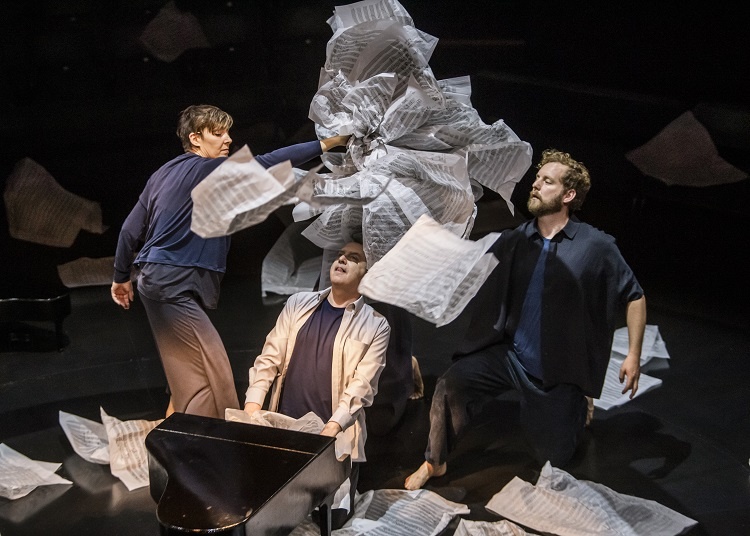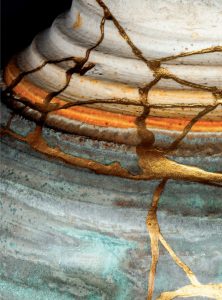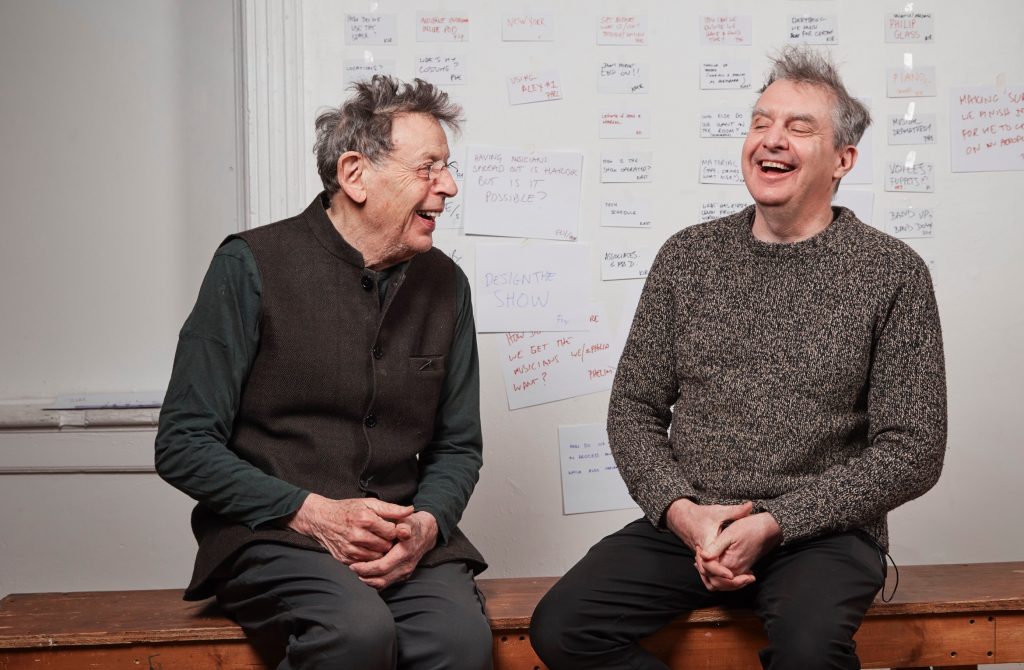A dream that became real

A dream that became real
Following a rapturous reception at MIF19, Phelim McDermott’s personal homage to Philip Glass continues to travel around the world with upcoming performances at Perth Festival and Ruhrfestspiele. We take a look back at the beginnings of the project with the creative team. Philip Glass, Phelim McDermott and Kirsty Housley discuss the making of Tao of Glass

BEGINNINGS
Phelim McDermott (PM): I don’t really know when I first heard Philip’s music – but I bought his album, Glassworks, and that was my first introduction. When I was at college, I thought, I’ve got to find out about this man. I ended up in the Middlesex Polytechnic Library watching old VHS videos of the original productions of Einstein on the Beach and Satyagraha [Philip Glass operas].
Kirsty Housley (KH): This is what I find interesting: you grew up with Philip Glass and I did too, but I wasn’t aware that I had. My introduction was also through film, but I didn’t know that it was Philip Glass. The Truman Show was probably the first time I heard his music, then someone recommended Koyaanisqatsi [scored by Glass]. I watched it and just thought: ‘Wow – this music.’
PM: He’s a very humble man: very approachable and human. They say don’t meet your heroes, because you’ll be disappointed. I haven’t been disappointed with Philip.
LOSS
Philip Glass (PG): Phelim and I spent some time together visiting Maurice Sendak [illustrator and children’s author, most famous for Where the Wild Things Are], and we were talking with him about [adapting] In the Night Kitchen. Before we got to do the piece, Sendak passed away – so that came to an end. Phelim asked if I would like to work with him on a new piece that would be a kind of replacement, and that turned out to be the Tao of Glass.
PM: The show became about the stories and conversation between me and Philip, and whether anything grew from that. Actually, Philip was interested in the fact that there was nothing there.
Tao of Glass is about what emerges from the space where there is nothing. Phelim McDermott
KH: I think when we first spoke about the show, what I was most interested in was the idea of absence. The idea that a show hasn’t happened and an empty space has been left. And that feels like a kind of grief, but actually in that space there’s hope, and possibility. Nobody knows what’s going to happen and therefore anything is possible.
PM: On one level, this show is about a number of dreams not happening. There was one point where Philip said, ‘You know, this show’s about loss, isn’t it?’
COLLABORATION
KH: We’ve got a sign on our wall that says ‘Be prepared to be surprised’, and I feel like Philip is the epitome of that. Some composers want you to do your bit first and then they know what they’re doing – but Philip wasn’t sat opposite Phelim saying, ‘Tell me what it’s about, Phelim, otherwise I can’t bring anything’. There was this really genuine collaboration.
PG: Of course, it didn’t happen the way he wanted it to, but that’s just life in the theatre world.
PM: I told Philip stories, he improvised, I responded to his music, and then he responded to me. He has the David Bowie cut-up mentality: let’s put these pieces in this order and it’s going to do something to your brain. It will do something to how you listen, how you perceive this piece of theatre.
The show is a bit of a collage, I think – it comes from lots of different places. There are echoes thematically across all the different stories, and when you glue them together, the whole is transformed. Kirsty Housley
KINTSUGI
PM: Kintsugi is a form of Japanese art where you take pieces of a broken vase and fix them together with golden glue, and it becomes more beautiful because it highlights its flaws. I would say that, on some level, the show is like a piece of kintsugi.
It’s not even like the pieces of the same pot – it’s pieces from about eight different pots.

KH: Every day we make good discoveries, then we hit a brick wall and have to rethink how we’re working. The stories existed when I came in and the process has been to discover how they will evolve and fit together – in a way, the meaning reveals itself through how they’ve been collated. It’s in the form as much as in the content.
QUESTIONS
PM: One idea of what the show was going to be was that I might ask Philip eight important questions – about creativity, life and mortality.
PG: I don’t remember Phelim sharing that idea with me. So he may have asked me the questions without telling me there were eight questions. During the workshops, he may have asked all the questions and got the answers, but I was not privy to the system.
PM: It’s not what ended up happening, because it didn’t feel right. Philip did say, ‘It’s hard being the sage, isn’t it?’
KH: That feels like a really important element of the show, though: that there are just some things that are impossible to articulate with words. Philip can’t give Phelim the key to successful creativity or living a brilliant life any more than anyone else can. But he can give you extraordinary music.

TAOISM
PM: It’s called the Tao of Glass – and one of the ideas of Taoism is that there are times when you may notice that you’re following nature, and what nature is asking of you or revealing to you, or you’re working against that. That’s very good as a creative process metaphor.
KM: It’s an incredibly difficult thing to do – I definitely can’t do it – and so there’s also something impossible about the Tao, which I really like. You can’t win it and you can’t know it. It’s about the journey of it.
PG: I’ve read the same books as everyone else has, but the books about Taoism make a point of telling you that they’re not going to explain Taoism. And they don’t!
KM: I’m interested in the humanity of trying to follow Taoism, and failing – the attempt is fascinating, but human nature can often get in the way.
PM: That’s the beauty of the Taoist version of dreaming. Maybe you will follow the Tao, which says to believe in your dreams – just don’t expect them to be manifested in the way you think they will.
There’s another way of dreaming that we’re interested in with this show, which is more meditative: it’s about being connected to reality and listening to your instincts.
DREAMING
KH: I feel like there are almost two different types of dreaming. One is really prevalent at the moment: sorry to be political, but it’s a very capitalist way of dreaming. It never allows you to be in the present. There’s always something that you want, so you’re spending your whole life trying to get that thing, which is always in the future.
But there’s another way of dreaming that we’re interested in with this show, which is more meditative: it’s about being connected to reality and listening to your instincts. It’s really the difference between daydreaming and having a life plan.
PM: The show is about a different kind of understanding of dreamland and where dreams originate. There’s a model in the show, Arny Mindell’s Deep Democracy model: if you go further down the cone of consciousness, there’s a kind of dreaming that happens pre-image, pre-words, that’s very easily marginalised within ourselves.
This dreaming is much more like a big, connected, unbroken wholeness where we are not separate people, or separate from nature. This whole show has grown from that place.
KH: Tao of Glass has been our dream in this room, but when it meets an audience, it will become a new dream that involves them too.
REALITY
PM: Tao of Glass will mean different things to people in different places. I like to think that if we create something that does continue, it will be open enough to unfold new stories that might get told.
PG: There are some interesting things involving my presence in the piece. Besides being the composer, I kind of have a ‘ghost’ presence: I will be with the piece at the performances, but I won’t be on the stage.
KH: Tao of Glass will continue evolving throughout its run in Manchester, at Perth Festival and beyond.
PM: You don’t really find out what you’ve done until an audience is sitting there – and that’s what theatre is. Dreaming together.
Tao of Glass premiered in Manchester International Festival in July 2019 and tours to Perth Festival, Australia from 19-23 February, 2020 and Recklinghausen, Germany from 3-6 May, 2020 as part of Ruhrfestspiele.
Kirsty Housley will also direct The Long Goodbye, a bracing and emotional live music show from musician, storyteller, actor and activist Riz Ahmed, commissioned by MIF that will premiere in Manchester this March.
Subscribe to our email updates
Let’s invent tomorrow together - subscribe to our email newsletters to be kept informed about upcoming events, work, learning and training opportunities and more. You can select what you would like us to email you about.
Read our privacy policy

